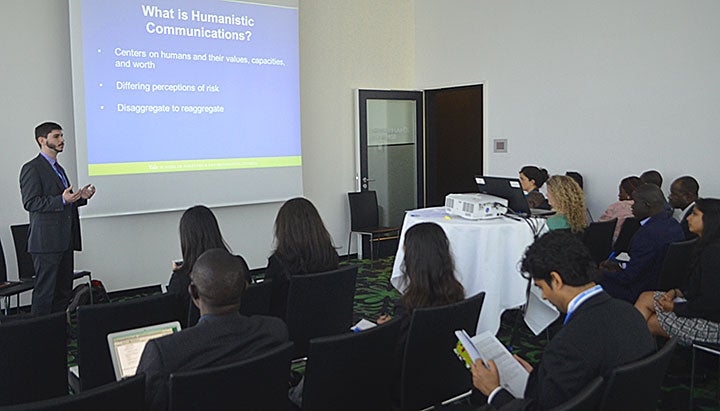There is no communications strategy to match the environmental challenges now facing the planet,
Paul Lussier says.
When it comes to explaining the threat of climate change, for instance, the traditional approach has been to broadcast the science to as large an audience as possible and hope that they understand the profound importance (the so-called “information deficit” model). The only problem, Lussier says, is that it has never worked. And he should know; During 25 years in television and film — including as writer and producer for the Discovery Channel — he was one of those telling the story.
Lussier, who is now a lecturer at Yale, wants students to find new ways to tell environmental stories. In
a new course he taught this spring at the Yale School of Forestry & Environmental Studies (F&ES), he encouraged students to explore new communications models that deliver messages with deeper impact.
At its heart the course emphasized a more humanistic approach to communications, in which all relevant stakeholders are convened to create narratives that are more likely to resonate with audiences.
By the semester’s end every student had helped produce communications strategies for high-level professional stakeholders — the first phase in what is expected to be a three-year project between those organizations and the School.
One student group worked with the United Nations Framework Convention on Climate Change (UNFCCC) on a communications strategy to help developing countries implement climate adaptation strategies. They were invited to present their findings at the UNFCCC’s annual National Adaptation Plan Expo, held in Bonn, Germany, in April.
Another group, working with an organization called the States’ Energy Leadership Project, immersed itself in the political dynamics of individual U.S. states to improve the chances of government support for renewable energy projects.
“In this class, we don’t lead with the climate science,” Lussier said. “We
leverage the climate science into a communication that has resonance and relevance.
“There is no single solution for any of these environmental challenges. So we need a new strategy that integrates the languages of different sectors — including business, policy, and ethics — and delivers projects that can actually achieve change.”
Throughout the semester a series of guest speakers — including
Andrew Revkin, author of the Dot Earth blog;
David Gelber, executive producer of the Showtime series, “
Years of Living Dangerously”; and
Robert Inglis, a former Republican congressman who reversed his stance on climate change — shared insights into how the challenge of climate change can be communicated through a variety of lenses, from economics to politics to ethics.
The students then worked with clients to develop new strategies inspired by these theories of humanistic communications.
In addition to partnerships with the UNFCCC and the States’ Energy Leadership Project, students worked with the UN’s Intergovernmental Panel on Climate Change (IPCC), the Natural Resources Defense Council, the United Church of Christ, and PR giant Fenton Communications.
In the case of the United Church of Christ, students developed a website that will help ministers make the link between the ethical implications of climate change and their own liturgical calendars.
The students working with Fenton, meanwhile, created a framework to more effectively reach conservative mothers about the profound importance of climate change. Those guidelines — which highlight, among other things, the importance of message
and messenger — could be utilized by any number of climate-related institutions or campaigns, students said.
In Bonn, the UNFCCC group shared its project at a gathering of more than 200 ministers and delegates from the world’s developing nations.
In addition to presenting the theory and practice of humanistic communications, they described some examples of how the model can be effectively used in the developing world. They highlighted, for instance, the case of Mozambique, where a coalition of stakeholders attracted international media attention by telling powerful stories of people whose lives were affected by river flooding, said
Sameera Savarala ’15 M.E.M., one of the group members.
“It was pretty intimidating at first,” she said. “But we didn’t come in saying, ‘
We’re the experts and this is how you should do it.’ It was more like, ‘This is what we’ve found, now what do
you think? And how can we improve the process?’… I think they really appreciated it.”
Indeed, Lussier said, organizations like UNFCCC see enormous value in re-evaluating how they communicate their work. In their case, he said, there are many potential opportunities to fund adaptation programs in the developing world. But they will never happen if funders don’t believe the projects are viable. Telling human stories, and bringing critical stakeholders together, will make it easier to address that challenge.
“In this case, it’s really a global partnership,” Lussier said. “The UNFCCC is excited about the chance to engage the School on an ongoing basis about how communications can be an important part in implementing and deploying adaptation knowledge, awareness, and projects.”
Don Mosteller ’15 M.E.M., a member of the group that worked with Fenton Communications, said the course reinforced some of his concerns about how climate issues are typically addressed by organizations and the media — and the inherent folly of simply lambasting critics of the science.
It was also an opportunity to develop the kind of communications strategy — in his case, about targeting conservative mothers — that no one else is working on specifically.
“The information-deficit model is the least effective way possible to talk about climate change,” he said. “Communication is by far the biggest hurdle in addressing climate change. The policies are all ready to go; the science is changing very marginally at this point and, if anything, we are learning that things are changing much faster than we thought… When it comes to communicating this, we really need to be throwing everything at the wall to see what sticks.”
